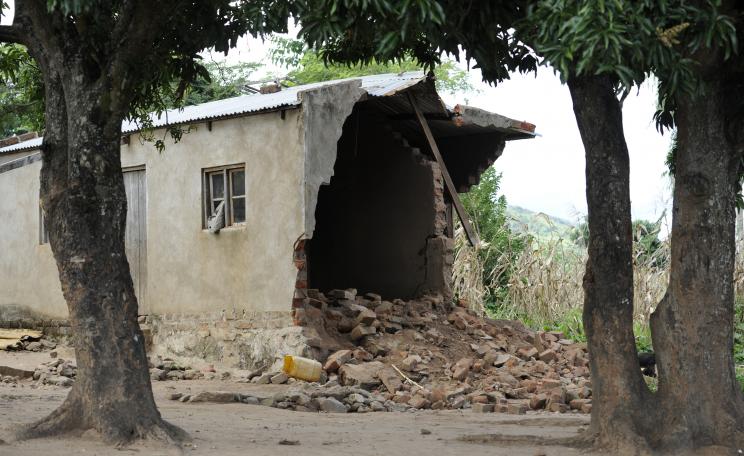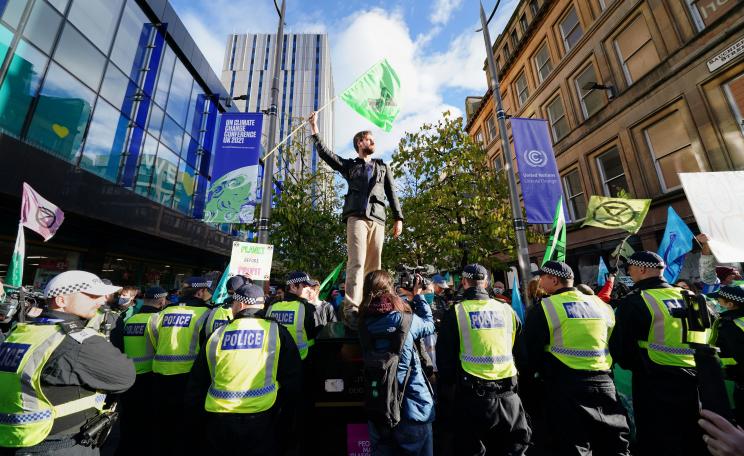We’re hopeful, but we’re not there yet…. If we are not successful then it's a terrible disaster.
Only after time allows the dust to settle upon Glasgow following the global stampede of delegates, journalists and activists alike, can its value, or lack thereof, truly be pondered upon.
The sensory overload of chasing humans, their experiences, thoughts and emotions takes time to distill. Regardless, the climate and ecological emergency insists on not being forgotten.
Much has been written, and to some, the subject might even seem stale. They may be right. As far as the news cycle is concerned, the world has moved on.
Shocking
Its focus shifted from a global gathering to massive flooding in Canada - 2021’s poster child for climate calamity - and immigrants drowning in the English Channel and even a new Covid strain.
The new normal, mayhap. Earth’s newsrooms moving on from the “blablabla” aside, nature is forcing the conversation.
And so, like a fine single malt Scotch, a slow distilled look at the global voices which congregated in Glasgow is worth reminiscing upon.
What follows are snippets of conversations had in the halls outside the plenary where a final tug of war between “phasing out” or “phasing down” coal played out among “the powers that be”. Passing the mike to these voices, we can in fact gleam how so-called “leaders” will ultimately be powerless to stop the unstoppable.
In the weeks leading up to COP26, a team of Al Jazeera journalists ventured as far north as Greenland which was “both beautiful, deeply shocking, and even sad, at the same time.” explained a member of their production team.
Damage
Ben, the production team’s cameraman, said: “We spoke to an ex-mayor in Kulusuk, an Inuit town on the east coast of Greenland. He told us how he essentially grew up in the stone age; in a stone hut with a grass roof. Due to climate change their area has lost all its ice in the winter as well as the summer.
"They used to live a good, happy life off the land, but thanks to climate change, their environment changed so drastically that they've been forced off the ice…"
Seve Paeniu, Tuvalu’s Finance minister, told The Ecologist how he “came … with a high level of hope that Glasgow would deliver on the fight against climate change" despite his home country being first in line to face the onslaught of our globally heating world, Pacific island nation.
"I am glad Glasgow has delivered a strong message of hope. What is now left is for everyone and every country to take action and deliver on the promise of Glasgow.”
Harjeet Singh, from the Climate Action Network in India, lamented how “the proposal developing countries had put forward on setting up a loss and damage facility” was clearly off the table.
Elites
“Instead they offer a dialogue, unacceptable to developing countries, because we have seen how such dialogues happening earlier did not result in any money. It’s like telling a family, or a woman who has lost her home, ‘we are going to talk about it, but we won't help you at all,’ That is not acceptable.”
We’re hopeful, but we’re not there yet…. If we are not successful then it's a terrible disaster.
Developed countries need to “show leadership,” he adds “and come forward, of course avoid the crisis by reducing their emissions, but also help developing countries with a greener transition and for protecting people from climate impact.”
Ingmar Rentzhog, the chief executive and founder of the Danish climate NGO We Don’t Have Time said: "It’s free to make pledges. There’s no accountability if you follow them or not, it doesn’t cost anything to make a pledge. I think if pledges are going to work, we need pledges which cost something if you don’t follow through."
Mala Maa, a member of the Tuvalu delegation confessed how she “came with high hopes and ambition that this COP26 will do something to save us, to save our small islands, to save our people, save my children and my grandchildren and, save the world.”
National delegates desperately tried to reach a final agreement which would make COP26 a success, while activists, observers and some pens decried the farce which would emerge: defanged, defiled and subservient to national and economic interests of governing and corporate egos and elites.
Civil society
The sense of doom hung around many hearts during the last desperate attempts by some 200 nations to agree something useful before final gavel, falling to mark the end of yet another failure. Tired, haggard and homesick journalists milled outside the plenary rooms.
Ilana Seid, Palau’s ambassador to the United Nations, said: “This is 200 nations which have to basically reach consensus, so we realise it's tough for everybody. I think developing countries, and very vulnerable countries, like Palau, have been very vocal about the climate action which needs to take place.
"We hope our words are heard, and I think it’s really up to the entire (global) community to rally behind us.... We’re hopeful, but we’re not there yet…. If we are not successful then it's a terrible disaster.
"I think we would have to look to the private sector and to civil society to try and solve the problems which clearly governments have not been able to solve.”
Bas Tuenter, a Dutch youth climate activist and member of YOUNGO, spoke to The Ecologist during the final plenary as observers were asked, once again, to vacate the premises.
Inclusivity
They were disappointed at "the exclusivity of COP26, the lack of access we had to negotiators, which has severely impacted our ability to represent youth from all over the world. We could have done so much more…”
Clemence Abbés Castillo, a Peruvian Oxfam delegate, described the process as “pretty disappointing."
She added: "The last version of the agreement is actually really weak. We're seeing that there is not sufficient progress on loss and damage, no sufficient progress on wealthier nations reducing their emissions, and I also think there is not enough progress related to really protecting the rights of indigenous peoples and local communities.”
El Hadji Mbaye Diagne, director of Afrique – Energie – Environnement, from Senegal, said: “The G77 doesn’t consider developed nations’ leaders have given the talks the necessary level and importance at a ministerial or political level to reach a deal.
"Technicians have worked very hard to bring some proposals. But when it comes to reconciling political positions, there was not enough inclusivity to reach a deal.”
Disappointments
Disha Sharkar, a Global Youth Development Institute delegate from India, added: “With regard to inclusivity, especially access to negotiation rooms, it was somewhat hampered due to Covid protocols.
"For global south people, it was not very accessible: the vaccination process. Also with regards to funding there were a lot of problems. However there was a lot of progress in the kind of work which was done, and we are looking forward to the implementation, and the youth are optimistic”.
But what of the United Kingdom’s efforts to lead the charge to steer humanity away from the brink of catastrophe. Is all lost?
UnaMay Gordon, head of Jamaica's delegation, who has been attending COPs for over a decade, said: “There’s always cause for hope. As people from small island states, if we lose hope, then we lose humanity.
"There’s always cause for hope. There have been some great agreements even from some developed countries, and there have been some disappointments. But, overall I think there is hope.
Fix
"What needs to be done, having been here, having hosted a COP successfully within a pandemic - because we should not lose sight of the fact that there has been no major (Covid-19) outbreak among the 20,000 people who have been here- … There have been some gains, not a lot, but I think the bar has been moved.”
Melissa Jimenez-GT, a young scientist and Extinction Rebellion climate activist from Mexico, was standing outside the final plenary session, moments before the final gavel fell and silenced COP26
She pondered on the purpose of COP and what the palpable climate struggle surrounding it represents: “We fight for what is worth defending: nature, biodiversity; all living organisms are worth defending.
"When we say they, our leaders, are not quite fighting for that, this is true. They are fighting for a system, to keep the status quo and carry on with business as usual. In fact, it is this which should be destroyed, and changed completely, and revolutionised. We need to generate a revolution.
"This is just the beginning. The beginning of a new awakening. We know what the problem is - the science has already told us what it is. Now the issue is how are you going to fix it, how are you going to deal with it."
Power
The focus is already beginning to shift to COP27 which will be held in Egypt, raising concerns about the lack of freedom of expression which may greet critics, activists and protesters next year.
Taseem Essop, from Climate Action Network International, said: “What will have to happen at an African COP27 is for them to pick up the pieces left behind by this COP26 for vulnerable people, for the millions and millions who are suffering. And the fact that it is being held in Africa makes it an African COP.
"It should be a COP for the vulnerable, and so the issue of whether there is going to be a democratic space or not… is up to civil society… Of course we’re going to have to fight for that space, and we will take space.
"So it doesn't matter what people think the situation will be, we have power, we will use power and we’ll do the same in whatever venue the COP is being held.”
This Author
Nicolás Eliades has been working in international, political and organisational communications, including journalism, for well over 20 years, spanning four continents. He was born in Nairobi, Kenya, and brought up in a Colombian and Cypriot-South African household. Past employers include US Department of State, EU’s European Commission, renown Colombian daily El Espectador, Africa’s biggest broadcaster, SABC, and George Soros’ Open Society Foundations.







